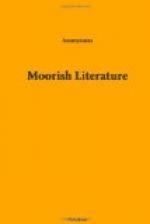“O papa, much bigger.”
Finally he stretched out fully his feet and legs. “As big as this, then?”
“Much bigger.”
“That is a lie; there is no animal bigger than I am.”
“Well, wait,” said the little ones, “and you will see.” The camel came back while browsing the grass of the roadside. The wren stretched himself out near the nest. The camel seized the bird, which passed through its teeth safe and sound.
“Truly,” he said to them, “the camel is a gigantic animal, but I am not ashamed of myself.”
On the earth it generally happens that the vain are as if they did not exist. But sooner or later a rock falls and crushes them.
* * * * *
THE MULE, THE JACKAL, AND THE LION
The mule, the jackal, and the lion went in company. “We will eat the one whose race is bad,” they said to each other.
“Lion, who is your father?”
“My father is a lion and my mother is a lioness.”
“And you, jackal, what is your father?”
“My father is a jackal and my mother, too.”
“And you, mule, what is your father?”
“My father is an ass, and my mother is a mare.”
“Your race is bad; we will eat you.”
He answered them: “I will consult an old man. If he says that my race is bad, you may devour me.”
He went to a farrier, and said to him, “Shoe my hind feet, and make the nails stick out well.”
He went back home. He called the camel and showed him his feet, saying: “See what is written on this tablet.”
“The writing is difficult to decipher,” answered the camel. “I do not understand it, for I only know three words—outini, ouzatini, ouazakin.” He called a lion, and said to him: “I do not understand these letters; I only know three words—outini, ouzatini, ouazakin”
“Show it to me,” said the lion. He approached. The mule struck him between the eyes and stretched him out stiff.
He who goes with a knave is betrayed by him.
* * * * *
THADHELLALA
A woman had seven daughters and no son. She went to the city, and there saw a rich shop. A little farther on she perceived at the door of a house a young girl of great beauty. She called her parents, and said:
“I have my son to marry; let me have your daughter for him.”
They let her take the girl away. She came back to the shop and said to the man in charge of it:
“I will gladly give you my daughter; but go first and consult your father.”
The young man left a servant in his place and departed. Thadhellala (that was her name) sent the servant to buy some bread in another part of the city. Along came a caravan of mules. Thadhellala packed all the contents of the shop on their backs and said to the muleteer:




